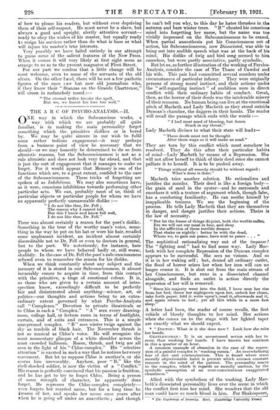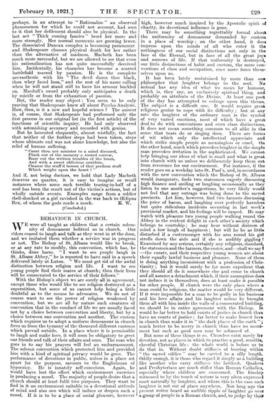THE A B C OF PSYCHO-ANALYSIS.—II.
ONE way in which the Subconscious works, a way with which we are probably all quite familiar, is in making the main personality forget something which the primitive dislikes or is bored by. We may be quite sincere in our wish to fulfil some rather tedious engagement—it may perhaps from a business point of view be necessary that we should—or we may honestly be determined to do so from altruistic reasons, but the Subconsciousness is not as a rule altruistic and does not look very far ahead, and that is just the sort of engagement that it manages to make us forget. For it would appear. that Memory is one of the functions which are, to a great extent, confided to the care of the Subconsciousness. These tricks of forgetting are spoken of as Inlaitions. We may also sometimes have, as it were, conscious inhibitions towards performing other particular acts. We can, probably most of us, think of particular objects or particular people for whom we have an apparently perfectly unreasonable dislike :- " I do not like thee, Dr. Fell
The reason why I cannot tell, But this I know and know full well, I do not like thee, Dr. Fell."
There was almost certainly a reason for the poet's dislike. Something in the tone of the worthy man's voice, some- thing in the way he put on his hat or wore his hair, recalled some unpleasant incident, an incident almost certainly discreditable not to Dr. Fell or even to doctors in general, but to the poet. We notoriously, for instance, hate people to whom we have behaved badly or, still worse, shabbily. In the case of Dr. Fell the poet's subconsciousness refused even to remember the reason for his dislike.
When we think constantly about any subject and the memory of it is stored in our Subconsciousness, it almost invariably comes to acquire in time, from this contact with the primitive, a tinge of emotional colour. It is, as those who are given to a certain amount of intro- spection know, exceedingly difficult to be perfectly fair and disinterested about anything—science, art, or politics—our thoughts and actions being to an extra- ordinary extent governed by what Psycho-Analysts call " Complexes." Devotion to private theatricals or to Chloe is each a " Complex." " A " sees every drawing- room, college hall, or lecture room in terms of footlights, curtain, and of exits and entrances. This is a simple unrepressed complex. "B" sees winter twigs against the sky as tendrils of black hair. The November thrush is not so musical as Chloe's voice. He will recognize the most momentary glimpse of a white shoulder across the most crowded ballroom. Room, thrush, and twig are all seen in the light of his " Chloe-complex." His " selective attent ion " is exerted in such a way that he notices her every movement. But let us suppose Chloe is another's, or she scorns him irrevocably. Anyhow, poor " B," like the shell-shocked soldier, is now the victim of a " Conflict." His reason is perfectly convinced that his passion is fruitless, and he has got to try to forget Chloe. Being a person of some strength of character, he apparently does forget. He represses the Chloe-complex completely- ) ven forgets her married name, but for a long time he dreams of her, and speaks her name once years after when he is going off under an anaesthetic ; and though he can't tell you why, to this day he hates thrushes in the autumn and bare winter trees. "B" cheated his conscious mind into forgetting her name, but the name was too vividly impressed on the Subconsciousness to be erased. When partial anaesthesia put his Consciousness out of action, his Subconsciousness, now Dissociated, was able to bring out into audible speech what was at the back of his mind. His dislike of twig and bird song seemed to him causeless, but were partly associative, partly symbolic..
But let us, as further illustration of the working of Psycho- Analysis, consider the case of The Thane of Cawdor and his wife. This pair had committed several murders under circumstances of particular infamy. They were originally persons of strong moral instinct, and their actions under the " sell-regarding instinct " of ambition were in direct conflict with their ordinary habits of conduct. Great, then, as the horror of their deeds was the intolerable misery of their remorse. No human being can live at the emotional pitch of Macbeth and Lady Macbeth as they stood outside Duncan's chamber, the daggers in their hands. The reader will recall the passage which ends with the words :— " I had most need of blessing, but Amen
Stuck in my throat."
Lady Macbeth divines to what their state will lead:— "These deeds must not be thought
After these ways so it will make us mad."
They are torn by this conflict which must somehow be resolved. They do this after their particular habits of mind—Lady Macbeth by means of a Repression. She will not allow herself to think of their deed since she cannot palliate it to herself. It is to be pushed away.
" Things without all remedy should be without regard : What's done is done."
Macbeth tries another solution. He rationalizes and justifies the murder. Their deed is like a foreign body— the grain of sand in the oyster—and he surrounds and smothers it with a texture of argument which, though false, has a comforting familiarity. He can soothe himself by inapplicable truisms. We see the beginning of the process. He tells Lady Macbeth that they are themselves in danger, and danger justifies their actions. Theirs is the law of necessity.
"But let the frame of things disjoint, both the worlds suffer, Ere we will eat our meal in fear, and sleep In the affliction of these terrible dreams That shake us nightly : better be with the dead, Whom we, to gain our peace, have sent to peace . . . "
The sophistical rationalizing way out of the impasse ! The " fighting soul " had to find some way. Lady Mac- beth with her complete Repression of the Duncan complex appears to be successful. She sees no visions. And so it is in her waking self ; but, denied all ordinary outlet, the flood of horror seizes her when her iron will can no longer censor it. It is shut out from the main stream of her Consciousness, but runs in a dissociated channel alongside, and finds an outlet in action directly the repression of her will is removed.
" Since his majesty went into the field, I have seen her rise from her bed, throw her nightgown upon her, unlock her closet, take forth paper, fold it. write upon't, read it, afterwards seal it, and again return to bed ; yet all this while in a most fast sleep."
A letter had been, the reader of course recalls, the first vehicle of bloody thoughts to her mind. Her actions when she comes on to the stage with her lighted taper are exactly what we should expect.
* " Docron : What is it she does now ! Look how she rubs her hands.
GENTLEWOMAN : It is an accustomed action with her to seem thus washing her hands. I have known her continue in this a quarter of an hour.
A common example of obsession in the case of the repres- sion of a painful complex is washing mania.' An overwhelming fear of dirt and contamination. This is found where some morally objectionable habit is present which arouses constant remorse in the mind of the patient. The personality reacts to the complex, which it regards as morally unclean, by the symbolic assumption of an over-conscientious exaggerated cleanliness."
Allied with the symbolism of the washing, Lady Mac- bath's dissociated personality lives over the scene in which the conflict first tore her mind. She wonders that the old man could have so much blood in him. For Shakespeare, • Tie Psychology of Insanity. Hart. (Cambridge University Frees.) perhaps, in an attempt to " Rationalize " an observed phenomenon for which he could not account, had seen to it that her defilement should also be physical. In the last act " Thick coming fancies " beset her more and more strongly. Her normal moments are growing fewer. The dissociated Duncan complex is becoming paramount and Shakespeare chooses physical death for her rather than the alternative of madness. Macbeth has been much more successful, but we are allowed to see that even his rationalization has not quite successfully deceived him. Incidentally, his character has become a scarred battlefield marred by passion. He is the complete neurasthenic with his The devil damn thee black, thou whey faced loon," and the rest of his name calling when he will not stand still to have his armour buckled on. Macduff's sword probably only anticipates a death by suicide or from the exhaustion of passion. But, the reader may object : You seem to be only proving that Shakespeare knew all about Psycho-Analysis. How, then, is it a new and hopeful science ? The answer is, of course, that Shakespeare had performed only the first process in our original list (in the first article) of the functions of scientific inquiry. He had only observed with astonishing accuracy and recorded with genius.
But he lamented eloquently, almost wistfully, the fact that neither of the further steps had been taken, steps whose ultimate end was not alone knowledge, but also the relief of human suffering.
" Canst thou not minister to a mind diseased, Pluck out of the memory a rooted sorrow, Raze out the written troubles of the brain, And with a sweet oblivious antidote, Cleanse the stunt bosom of that perilous stuff Which weighs upon the heart ? "
And if, not being doctors, we hold that Lady Macbeth deserves no quarter, it is easy to imagine or recall instances where some such terrible tearing-in-half of a soul has been the result not of the victim's actions, but of wholly outside events. Examples range from a soldier shell-shocked or a girl ravished in the war back to (Edipus Rex, of whom the gods made a mock. E. W.
(Concluded.)



































 Previous page
Previous page